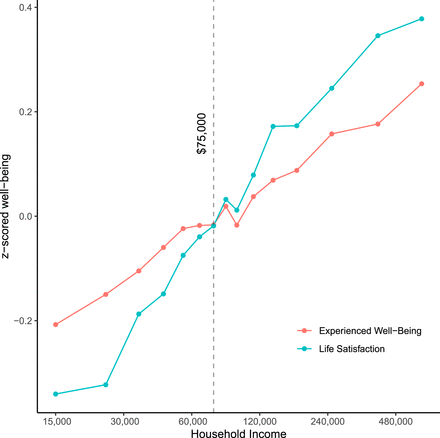1. So, money does buy happiness, real as well as imagined. But it costs more as you get richer.
What does that mean? Let's explore. https://www.pnas.org/content/118/4/e2016976118
What does that mean? Let's explore. https://www.pnas.org/content/118/4/e2016976118
2. First, we need to understand that there are 2 kinds of happiness (that are studied by researchers). "Experienced well-being" and "Evaluative well-being"
The former measures what you feel on a day-to-day basis, while the latter asks you to evaluate your satisfaction with life
The former measures what you feel on a day-to-day basis, while the latter asks you to evaluate your satisfaction with life
3. For "Experienced well-being" your mobile phone pops at random times of the day to ask you "How do you feel right now?" and you can pick any value on a scale from "Very Bad" to "Very Good"
The average of these answers across months becomes your experienced well-being
The average of these answers across months becomes your experienced well-being
4. For "Evaluative well-being" you are asked "Overall, how satisfied are you with your life?" and you can pick any value on a scale from "Not at all" to "Extremely".
This question requires you to take a long-term/wholistic view of life whereas the previous one was about "now"
This question requires you to take a long-term/wholistic view of life whereas the previous one was about "now"
5. Today, I'm equating "experienced well-being" with "real happiness" and "evaluative well-being" with "imagined happiness".
(This is not what the researchers say. And it is an over-simplification. But this is my thread, and if you disagree, write your own thread.)
(This is not what the researchers say. And it is an over-simplification. But this is my thread, and if you disagree, write your own thread.)
6. There is a famous older result by Nobel-prize¹ winner Kahneman which says that beyond $75000 per year, money only buys you imagined happiness, whereas real happiness stays constant beyond that point.
7. The implication was that rich people just *feel* they're happier when they're in a reflective mood drinking expensive wine, but in reality, on a day-to-day basis, they are just as miserable as middle-class losers.
8. However, this new research claims that the rich people are actually happier even in real terms. And more money continues to make them happier.
9. Why are they getting different results from Kahneman? We know that a lot of psychology/sociology research is non-replicable bullshit, but Kahneman is actually one of the good guys, so what gives?
The explanation is of course that mobile phones have made the difference.
The explanation is of course that mobile phones have made the difference.
10. I'm sorry to have given you the impression that mobile phones have made people happier. Nope. There's lots of (non-replicable?) psychology research proving otherwise.
Actually, ubiquitous mobiles have allowed for the first time real happiness to be measured on a large scale
Actually, ubiquitous mobiles have allowed for the first time real happiness to be measured on a large scale
11. Kahneman's research, in the absence of ubiquitous mobiles, tried to measure day-to-day well-being by asking people questions like "How were you feeling that day?" which is prone to lots of biases and memory effects.
12. So, anyway, what does the latest research tell us? Let's look at the graph again. There are a bunch of interesting aspects to it.
13. Both the happiness plots (real and imagined) are more-or-less straight lines. Keep in mind that this is a semi-log graph. Which means that to get the same increase in happiness, you need to get the same *percentage* increase in income.
14. In other words, $10000 dollars means far far more to a poor person than it means to a rich person (obvious!). It also means that a 10% increase in income gives the same happiness to @ElonMusk as it does to you.
15. Also notice that the real happiness curve (orange) has a gentler slope than the imagined happiness curve (green). This means that rich people continue to find it easier to forget about their day-to-day struggles and have greater overall satisfaction than poor people.
16. Another thing to notice is that the y-axis gives the z-score. Which means that it shows how many standard deviations above mean your happiness is.
A quick look at the y-axis shows that the z-scores are quite small. Let's understand the meaning with a couple of examples.
A quick look at the y-axis shows that the z-scores are quite small. Let's understand the meaning with a couple of examples.
17. An income of $240000 appears to give imagined happiness of +0.23, and real happiness of +0.18. This would put you in just the 59 and 57 percentile of happiness.
To become really happy, you need exponential amounts of money. (Yes, exponential is the correct technical term)
To become really happy, you need exponential amounts of money. (Yes, exponential is the correct technical term)
18. All this is mildly interesting. Makes it sound as if the only thing you can do to increase your happiness is to increase your income.
But the good stuff is buried in the discussion section where three-way between money, happiness, and your attitudes is analyzed
But the good stuff is buried in the discussion section where three-way between money, happiness, and your attitudes is analyzed
Have to go do some real work now, but I'll come back tomorrow to do a thread on what the research says about how your attitudes towards money control your happiness.

 Read on Twitter
Read on Twitter


